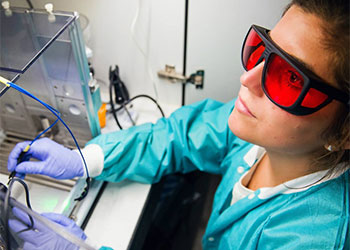The undergraduate program in the Department of Biomedical Sciences within the College of Health Sciences provides a distinctive area of study to Marquette students and is specifically designed to prepare individuals for careers in the health industry.
Why Biomedical Sciences at Marquette?
The program is unique for several reasons:
- The curriculum consists of human-oriented and medical science courses. Thus, students take courses normally reserved for professional students, such as human anatomy and gross anatomy, pharmacology, general and molecular pathology, human microbiology, and medical genetics.
- Opportunities exist to complement a strong science background with a minor or two to gain a competitive advantage in the job market. Because of this elective flexibility, biomedical sciences majors often obtain minors in disciplines such as business administration, marketing, communications, computer science, or a foreign language.
- Research opportunities for students are abundant, and can include semester long work as well as an intensive 10-week annual summer research program.
- The curriculum is dynamic, and student-learning outcomes are assessed annually to ensure the most effective educational experience.
- Our faculty members are simply outstanding, and:
- Conduct cutting-edge biomedical research. As a result, current findings are incorporated into their courses.
- Are the same faculty that teach professional students in the school of dentistry, the physical therapy program, and physician assistant studies program.
- Are committed to the institutional mission, ensuring that students are carefully mentored by individuals involved in community service and outreach. This helps develop a strong sense of social justice in many of our graduates.
- Are highly accessible to students. For example, faculty and students participate in an annual retreat to discuss career pathways, strategies to gain acceptance to professional and graduate programs, and ideas to improve the overall educational experience in the major.
Learning Outcomes
Students will be able to:
- Demonstrate knowledge of the structure, organization, interactions of molecules, cells, and tissues
- Demonstrate in-depth knowledge of tissue organization and function
- Demonstrate in-depth knowledge of molecular function of cells
- Demonstrate in-depth knowledge of how pathological dysfunction at the molecular, cellular or systems level leads to human disease and/or guides its treatment.
- Demonstrate knowledge of the interactions between societal factors and human disease and their impact on each other.
- Proficiently interpret data from various modalities and apply evidence-based reasoning to problem solving.
- Demonstrate the ability to critically analyze topics and issues related to biomedical sciences
- Demonstrate the ability to communicate, collaborate and work effectively with others
Career Paths in the Biomedical Sciences


